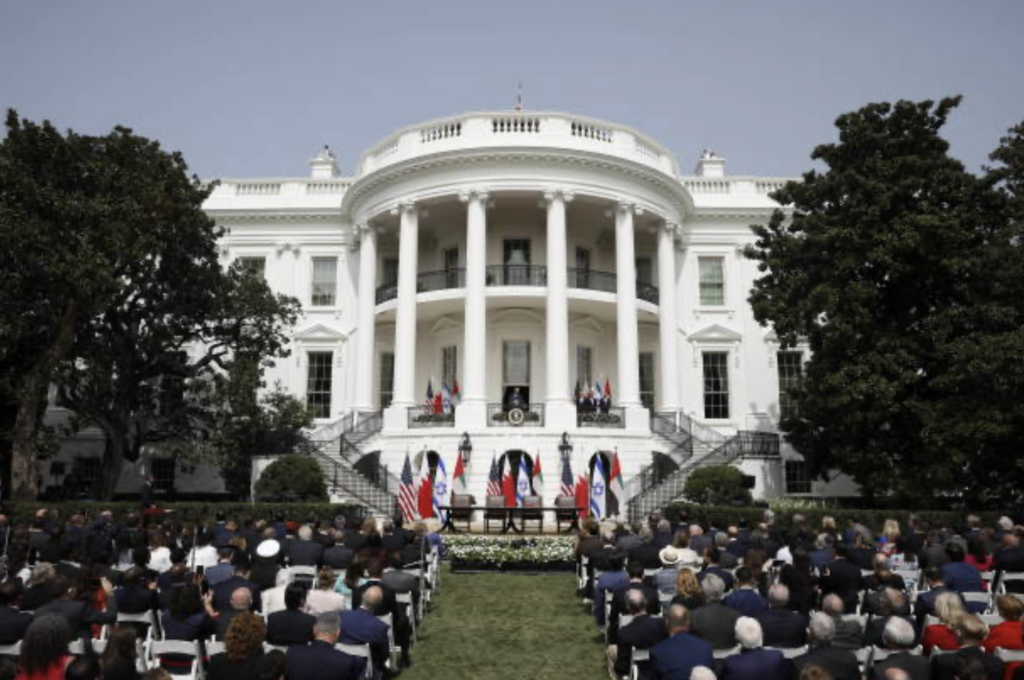These agreements, initiated by the United States under the presidency of Donald Trump, saw countries, such as the United Arab Emirates and Bahrain, normalize diplomatic relations with Israel, followed by Morocco and Sudan. By breaking with decades of pan-Arab politics, these agreements redefine the balance of power in a region traditionally marked by conflicts and ethno-religious rivalries.
The repercussions of this normalization are multiple, ranging from the reconfiguration of strategic alliances to the marginalization of the Palestinian question, including an increase in tensions between regional powers, notably Saudi Arabia and Iran.
A strategic rebalancing in the region
Historically, hostility between Israel and Arab countries was based on the Palestinian issue, with a broad consensus among Arab states that lasting peace with Israel could not be envisaged without a fair solution to the issue. However, the Abraham Accords revealed a major shift in the geopolitical priorities of some Arab countries, particularly those in the Gulf. The United Arab Emirates and Bahrain saw in normalization with Israel a strategic opportunity to strengthen their national security, their economic positioning, and above all to face a threat perceived as more pressing: the growing influence of Iran in the region.
Israel, with its advanced military and technological capabilities, is seen as a strong ally in the face of Iran’s regional ambitions, particularly in the areas of defense, cybersecurity and intelligence. The Abraham Accords thus secured an axis of cooperation between these Arab Gulf countries and Israel, which is based on common interests, particularly around regional security and economic development. These agreements also made it possible to facilitate economic exchanges, particularly in sectors such as renewable energies, high technology, tourism, and agriculture, thus creating new dynamics of cooperation.
The marginalization of the Palestinian question
One of the most visible consequences of the Abraham Accords is the marginalization of the Palestinian question in the diplomatic priorities of certain Arab countries. For decades, support for the Palestinian cause was at the heart of Arab policy towards Israel, with the Arab League conditioning any normalization of relations with Israel on the creation of a Palestinian state based on the 1967 borders. However, the United Arab Emirates and Bahrain chose to go beyond this framework by concluding bilateral agreements without demanding significant concessions from Israel on the question of the Palestinian territories.
Palestinian leaders have denounced this normalization as a betrayal, saying it undermines their position in negotiations with Israel and reinforces the isolation of their cause. Thus, the Abraham Accords mark a decline in Palestinian priorities in regional diplomacy, a development that could further complicate efforts to achieve a two-state solution.
The normalization of relations between Israel and several Arab countries has also exacerbated tensions between Iran and its regional rivals, notably the United Arab Emirates and Saudi Arabia. Iran, which presents itself as Israel’s main opponent in the region, sees the Abraham Accords as a direct threat to its geostrategic interests. Tehran considers these agreements as a de facto alliance against its influence, in particular because of the military and security cooperation between Israel and the Gulf monarchies.
The lack of consensus within the Arab world
Although the Abraham Accords received enthusiastic support from the United Arab Emirates, Bahrain and some other countries, they also exposed divisions within the Arab world. Countries like Algeria, Iraq and Lebanon, strongly influenced by pro-Palestinian movements or militias supported by Iran, have strongly condemned this normalization. Egypt and Jordan, which have signed peace treaties with Israel in the past, have remained cautious, maintaining their support for a two-state solution but without directly opposing the agreements.
These differences underline the fact that normalization with Israel does not yet achieve consensus within the Arab world, and that the Gulf States are now positioning themselves as the main architects of a new geopolitical approach in the region. This fragmentation could limit the effectiveness of collective initiatives within the Arab League, which is struggling to adopt a unified position on major issues, including the Israeli-Palestinian conflict.
The Middle East therefore finds itself at a turning point: the Abraham Accords could either usher in an era of stability and prosperity, or exacerbate existing tensions, making the resolution of deep-rooted conflicts in the region even more complex.










